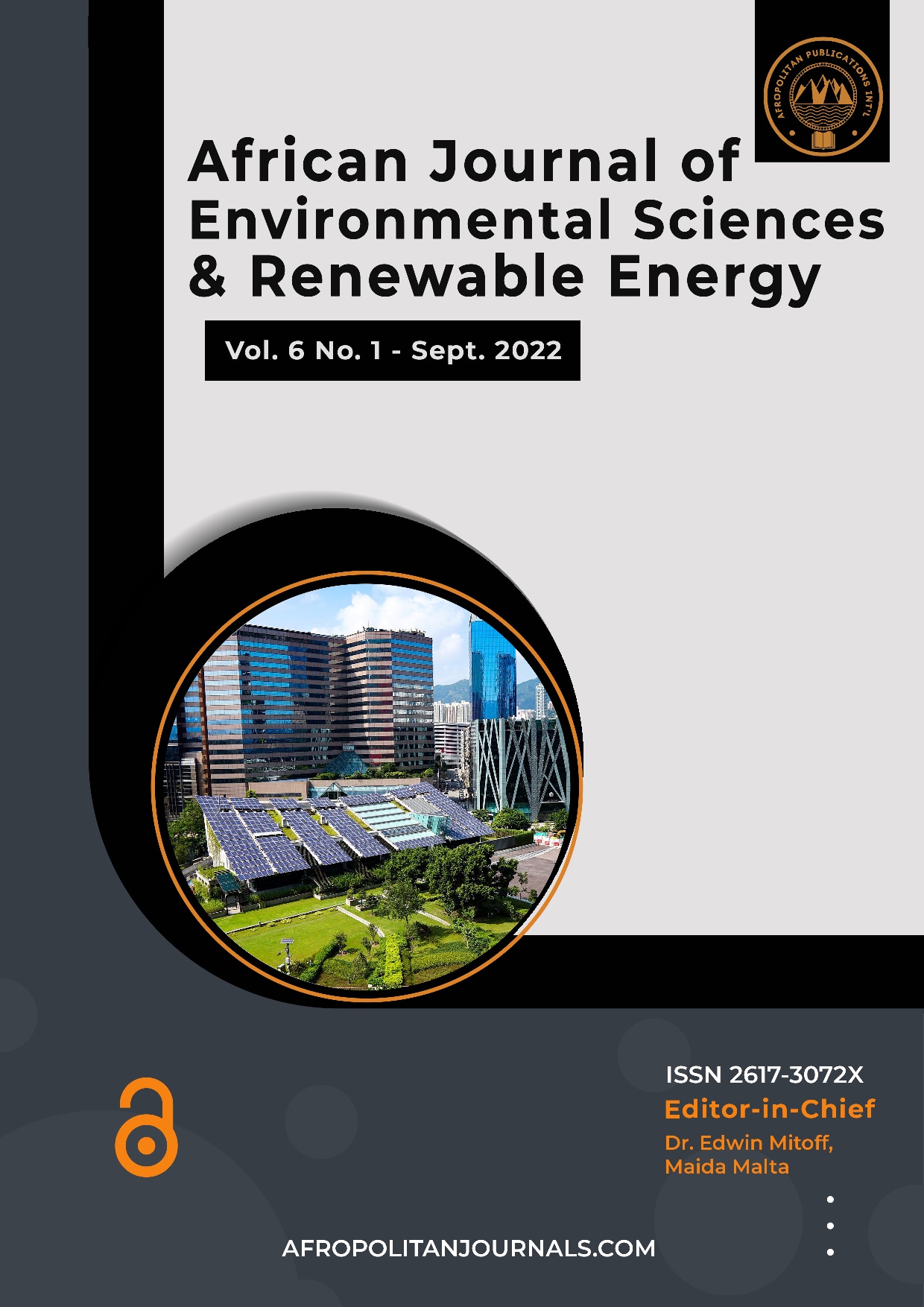Assessment of Infrastructure Provision in Housing Delivery in a Public-Public Partnership in Abuja, FCT
Main Article Content
Abstract
There exist in the provision of adequate housing with the requisite infrastructure to make for better living condition. Over the years, government through a National Housing policy, has continue to come up with some strategies in housing provision and encouraged privately developed housing investment to thrive and minimize deficit. Abuja was conceptualized as an integrated and sustainable city and planned to avoid the numerous problems plaguing other Nigerian megacities, while emphasizing the inter-relationship of infrastructure, housing, economic, social services, open space, and recreation. The population in this study is drawn from the participants of the Public–Private Partnership housing delivery, personnel staff of Mass Housing Department, FCDA and Mass Housing Unit in Department of Development Control, FCTA in charge of supervision and monitoring, the developers and occupants of the developed housing. Data was made through questionnaire administration and interview to the sampled population. Summary of findings reveals the impact of infrastructure on housing provision through public-private partnership in the study area in the study area.
Downloads
Article Details

This work is licensed under a Creative Commons Attribution-NonCommercial-NoDerivatives 4.0 International License.
References
Akeju, A.A., (2007) Challenges to providing Affordable Housing in Nigeria. Paper presented at 2nd Emerging Urban Africa International Conference on Housing Finance in Nigeria, Abuja October17-19, 2007.
Alao, D.A.,(2009) A Review of Mass Housing in Abuja, Nigeria: Problems and Possible Solutions Toward Sustainable Housing. Eastern Mediterranean University, Gazimagusa Cyprus
Alshawi, M. A., (2009) Concept and Background to Public Private Partnership (PPP)/ Private Finance Initiative (PFI) U.K. Experience
Annez, P. 2006. Urban infrastructure from private operators: what have we learned from recent experience? World Bank Policy Research Paper 4045.
Appadurai, A (2000), “Deep Democracy: Urban Governmentality and the Horizon of Politics” Environment and Urbanization, Vol.13 No. 2.
Arayela,O., & Taiwo, A.A., (2010) Stabilized Laterite Bricks as an Appropriate Walling Material Technology for Increasing Housing Stock in some selected African Countries. Proceedings of XXXVII AHS, world Housing Congress, October 26-28 Santacher (Cantabria, Spain)
Aribigbola, A., (2008) Housing Policy Formulation in Developing Countries: Evidence of Programme Implementation. Journal of Human Ecology Vol 23 No. pp.125-134
Arku, G. (2006) The Housing and Economic Development debate revisited: Economic Significance of housing in developing countries. J Housing Built Environ Doi: 10.1007/s10901-006-9056-3
Babarinde, J.A., (1998) Analysis of Industrial Relocation in Relation to housing and Infrastructural Services in Metropolitan Lagos. The Lagos Journal of Environmental Studies Vol.1.No.1.PP.97-108.
Ebehikhalu, O. N., and Dawan, D. P., (2015) A Review of Governmental Intervention on Sustainable Housing Provision for Urban Poor in Nigeria. International Journal of Social Science Studies vol.3, No,6, URL: http://dx.doi.org/10.11114/ijsss.v3i6.1069
Emerole, C.G., (2002) Restructuring Housing Development and Financing in Nigeria: The Role of Partnership and Collaboration Strategies. Housing Today Vol.1, Issue 5, Pp 26-29
Essex S., Smith B. and Williams P., (2008) “Affordable Housing”, Task and Finish Group, Report to the Deputy Minister for Housing, U.K., retrieved March 17, 2016 http://gov.wales/docs/desh/publicatios/080623affhousingtdpmreporten.doc
FOX, W.F., (1994) Strategic Option for Urban Infrastructures Management. Urban Management Programme cited in Ajibola, M.O., Awodiran,
O.O., Salu-Kosoko, O., (2013) Effects of Infrastructure on Property Values in Unity Estate, Lagos, Nigeria. International Journal of Economy, Management and Social Sciences Vol.2, No.5, P.P.195-201 May 2013
FRN, (1999) The Constitution of The Federal Republic Of Nigeria
Giddings, S. (2007). Housing Challenges and Opportunities in Sub-Sahara Africa. International Housing Coalition (IHC) Housing For All, Washington.
Green, R. and S. Malpezzi. 2003. A Primer on U.S. Housing Markets and Housing Policy. Washington, D.C.: Urban Institute Press.
HCA and Regeneris Consulting (2010) The Role of Housing in the Economy
Ikoku, G., (2004) The City as Public Space: Abuja- the Capital City of Nigeria, University of Newcastle, U.K. vol.1 Issue1, 2004.
Sengupta, U and Tipple, A.G. (2007). The Performance of Public-sector Housing in Kolkata India, in the Post –reform Milieu. Urban Studies 44(10) 2009-2037
Sheppard, S., & Hill, R. (2005) “The Economic Impact of Shelter Assistance in Post-Disaster Settings” (Cooperative Housing Foundation,).
Shelter (2013) Solutions for the housing shortage - How to build the 250,000 homes we need each year
Ukoje, J.E., Kanu, (2014) Implementation and the Challenges of the Mass Housing Scheme in Abuja, Nigeria. Center for Promoting Ideas, USA, American International Journal of Contemporary Research Vol.4, No.4, April, 2014.
Ukwayi, J. K., Eja, E.E., Ojong, F. E., & Otu, J. E. (2012). An Assessment of Housing Delivery In Nigeria: Federal Mortgage Bank Scenario. Canadian Social Science, Vol. 8, No.6, Pp8-74. U.N. Habitat, (2012). DOI:10.3968/j.css.1923669720120806.1613
Umoh, N.,(2012) Exploring the Enabling Approach to Housing through the Abuja Mass Housing Scheme. Massachusetts Institute of Technology achieves.
UNDESA (2014) World urbanization prospects: The 2014 revision highlights. United Nations, New York. http://esa.un.org/unpd/wup/Highlights/wup2014-Highlights.pdf
UN-Habitat, (2001) National Trend in Housing Production Practices (Vol.4, pp. 60-69). Nigeria Nations Center for human settlements. http://www.chs.ubc.ca/archives/files/HS-313.pdf
U.N.- Habitat (2002). A United Nations Report on Human Settlement: The Changing Shelter Policies in Nigeria. Retrieved from: www.un-habitat.org.
UN-Habitat (2003) Global report on human settlement: The challenges of slums UN-Habitat, Nairobi

